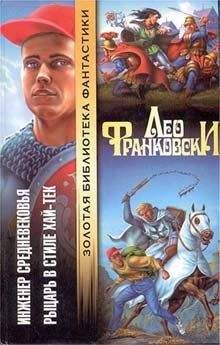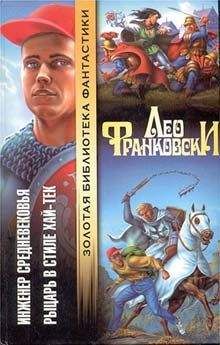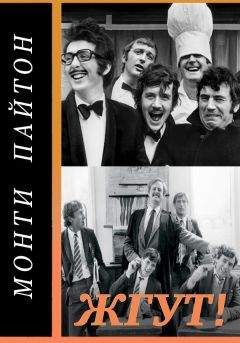Лео Франковски - The Flying Warlord
She nodded YES, but sulkily.
"I know you don't want to leave me. I don't want to leave you either, but this is the sensible thing to do. Look, give me a hug."
I hugged her neck, her chin pressed firmly to my back.
"Anna, you know I've loved you since we first met. You've always been my best friend, and no matter what happens, you always will be."
She signaled "ME TOO." I felt a tear forming.
"Good. Now be off with you, love, and take good care of Vladimir! I love you!"
She galloped back west.
Captainette Lubinski, the woman commanding East Gate, came out to report to me.
"We have over twenty thousand people in there, sir. I tell you that they're stacked up to the stone rafters! We can't possibly take any more!"
"Then don't," I said. "There's plenty of room in Hell. Send all the newcomers there."
"But everybody wants to be in here!" she said. "They've all heard that this fort is invincible."
"It just might be. But there is a limit as to how many people it can hold. You'll just have to shut your gates and tell them to walk another day to Hell. It's the only thing you can do! Oh, give them some food and water, of course, but send them on their way!"
"Yes, sir, but some of them-"
"But nothing, Captainette! It's not what they want that counts! It's what we can possibly do! You have your orders. Dismissed."
She was crumbling already, and the battle hadn't even started. I wondered if I should replace her, but I didn't know any of the other women here well enough to pick her replacement. Maybe she'd be all right.
The boats pulled up to the dock and their front drawbridges went down. They must have been carrying a thousand refugees each.
"Send those people on their way to the Warrior's School!" I shouted to the troops standing around. "There's no room for them here!"
Baron Piotr had gotten there before me, and he had his crew organized. He was to run Tartar Control, our command and control center, acting as my chief of staff. He only had two dozen radio operators and clerks under him, but in fact he would be running the Battle for the Vistula-under my occasional direction, of course.
The RB1 Muddling Through was a command boat, the only one we had. It had six radios instead of the usual one, so we could cover all the frequencies that we used without retuning. It had an operations center with a big situation map, plus bedroom space for all the extra people. Aside from that, it was just another steamboat.
It was late afternoon by the time the boats had taken on more coal and supplies, loaded the troops, and headed downstream. As we left, two other boats were coming up to replenish their coal. I gave their masters a chewing out over the radio for being so bunched up.
RB1 EG TO RB18 EG AND RB26 EG. WHAT ARE YOU?
TWO WOMEN WHO MUST HOLD HANDS ON THE WAY TO
THE POTTY? THE NEXT TIME I SEE YOU SO CLOSE TO
GETHER, I WILL PERSONALLY DRESS BOTH OF YOUR
BOAT'S MASTERS IN BUNNY SUITS! CONRAD. OUT.
Our range being as short as it was, the rules were that any boat between the sender and the receiver should relay the message onward. In this case, where all units concerned were at the same location, it shouldn't have been relayed at all, but the substance of the message was such that I knew the radio operators would send it the full length of the line, which is what I wanted.
Doctrine was that the boats should be evenly spaced.
We had three-gross miles of river to patrol, upstream and down, with three dozen boats. They should have been two dozen miles apart!
We got on the radios and had all boats report their positions and headings. If they bunched up, that meant long stretches of the river weren't being patrolled. It also meant that boats might be so far apart that radio messages between them might not be received, and that could cut our communication lines in half. We put markers on a map and started getting things organized. By midnight, we had schedules for all of them, where they should be at what time, assuming they weren't involved with refugees or Mongols. Even then, they were supposed to try to make up the time, since the schedule had them moving at only half speed.
At dawn, the RB9 Lady of Cracow reported a heavy enemy concentration across the river from Sandomierz. I told them to make a three-mile switchback, letting them hit the concentration three times. They complained vigorously when I ordered them to continue the patrol, but the RB20 Wastrel would be on station in minutes to take over the load.
The next four boats by there did the same, while we saw only scattered patrols. I wasn't going to let a bunch of boatmasters, excited at their first contact with the enemy, upset our schedules! As long as we could keep the bastards on the west side of the river, we'd get them all eventually.
But when we got near Sandomierz, I saw that they hadn't been exaggerating a bit. Through my telescope, I could see the Mongols had troops thirty deep along the shoreline. More importantly, at the shoreline men and horses were piled five and six high, and dead! There must have been twenty thousand dead along that sector of river, but they kept on coming. The riverboats were earning their pay!
Chapter Fifteen
I ran below decks and told Piotr to order the closest dozen boats to join the fun. We could just cruise up and down, raking them with everything we had except the flamethrowers, which had to be reserved for bridges.
That done, I opened the hatch to go back up on deck. A dozen Mongol arrows flew in at me! Four stuck in my armor and by the time I had them pulled out, I had been hit two more times. But I wasn't hurt. That armor really worked! So I ignored the arrows and pressed on.
On deck, the men looked like pincushions and were laughing about it. The deck itself was so filled with arrows that you couldn't take a single step without breaking some. Tadaos had the boat running a few dozen yards from shore, letting them hit us but making sure that we couldn't miss!
I saw a warrior go down with an arrow in his eyeslit; and another man take his place at the gun before the first had hit the floor. But the medics were right there and there wasn't anything I could do. Men running up ammunition moved with a skating motion that broke off the arrows so they wouldn't have to step on them.
The noise was deafening. Both starboard peashooters were firing without letup, throwing six hundred rounds a minute into an almost solid mass of Mongol troops. Those iron balls had about the ballistics of a carbine bullet. When they hit a man, he was wounded or dead, armor or no armor. Shooting into that tangled mass, I don't see how any of them could possibly have missed.
The sides of the boat were two and a half stories high, with smooth surfaces so they couldn't be climbed. But I saw a Mongol try to get in by grabbing on to the paddle wheel. I got my sword out, but before I could swing, the man was killed by one of the arrows flying at us. His body continued around and back into the water. I sent a runner to get a dozen men with pikes to guard the rear railing, and watched it until they arrived.
The Halmans were chunking away, and Tadaos was aiming one himself, laughing and shouting with every round that exploded above the mass. It was good shooting and better loading, because the loader had to time the fuse so that it exploded just above the heads of the enemy. Too high or too low and much of the effect was lost. The millions of rounds expended in training were paying dividends. Mongols were dying in droves.
The gunners from our boat's company of troops had their three dozen swivel guns set up on deck, adding joyfully to the carnage. Their rounds were far more powerful than those of the peashooters. You could see rows of three and four horsemen go down, all killed by the same bullet!
I'd heard that in modem battles, a quarter-million rounds are fired for every enemy killed. We were averaging considerably better! In fact, I never saw anybody miss!
And everything we were doing was soon multiplied by twelve, since the men in the other boats weren't acting like old maids either!
Any sane army would have run away from us, but these people weren't that sane. A modem army might have dug in. but that hadn't occurred to these horsemen, and with luck, it never would.
I could imagine Mongol commanders in the rear hearing about the slaughter and not believing it! I could imagine them sending observer after observer forward and not having any come back. Or better yet, going forward to see for themselves what the racket was and doing a bit of dying of their own!
It was likely, since our gunners always went after anyone who wore a fancy outfit or looked like he was giving orders. Besides a loader, each gunner had an observer whose job it was to point out good targets, and a boat gunner's helmet had "ears" on it pointing backward so he could hear what was being shouted at him.
After a few miles of this, we started running out of Mongols, so Tadaos had the boat turned around and we went upstream for some more gleeful mayhem. The troops quickly remounted their swivel guns on the port railing and reloaded. There were so many arrows stuck to the inside of the port parapet that they had to get out their axes and clear away the gun ports before they could mount their weapons! The men on the port peashooters, who had been dying of frustration up to this point, got ready to get their inning in.
The RB7 Invincible was coming downstream at us, followed closely by the RB12 Insufferable, so we had to stay a little farther out in the channel and try not to shoot holes in them.
The sun was well up now, and shining in our eyes, but we didn't need accurate shooting at this point, we just needed shooting! Even at a gross yards, we could hardly miss that mass of enemy troops.
I went to the starboard side and looked over. Since it was only sheet metal over wood, there were thousands of arrows stuck in the ship's armor. But I guess we had judged the metal gauge right, since none of them penetrated all the way.
On the opposite shore, people on the walls of Sandomierz were waving at us, cheering us on. But sightseeing, I wasn't doing my job. I turned to go back down to the control room when a plane flew over. One of the oversized message arrows thunked into the deck. I picked it up myself and waved at the pilot. He wagged his wings and flew off.
Downstairs, I read the message.
"Praty gud!" it read. "Bot they mak a bridge 7 mil downstream of U. Lambert." So Count Lambert was finally learning how to read and write! A pity about his spelling, though.
I checked the situation board and found that we had no boats between Sieciechow and Sandomierz. There should have been, but nobody nearby wanted to miss out on the action here. I sent a message to Tadaos to turn downstream again and radioed RB17 The Ghost of St. Joseph to follow us.
The RB21 Calypso reported that another concentration of Mongols west of Brzesko had been spotted by a plane, and wanted to turn back and investigate. With the planes flying, we really didn't have to keep up a steady watch for breakthroughs from the boats. Permission granted.
As we proceeded downriver, it was soon obvious what Lambert had seen. Along the shore, a long line of small boats was being lashed together, gunwale to gunwale, and ropes and logs were being fastened on top of them to form a roadway. All the boats on the west bank were supposed to have been destroyed, but I guess that hadn't happened. Once completed, they would swing that pontoon bridge into the current and fasten it to the opposite shore. At least that looked to be their plan.
I called for Captain Targ, who commanded the company of troops we had on board.
"I need three platoons with axes," I said.
"Good, sir. The boys down below have been looking for something to do. It's no fun for them, sitting there while everybody else gets to play," he said, grinning.
"Such a rough life. Bow landing, you know the drill. And move some of your gunners up to the bow."
"Aye, aye, sir."
Piotr sent a message to RB17 The Ghost of St. Joseph to get their troops ready to take out the downstream half of the bridge. I went to Tadaos, who was pulling Mongol arrows from his deck and saving them.
"Most of these are long enough for me to shoot," he said. "I suppose you'll be wanting the flamethrower warmed up."
"No, we do this one with axes," I said. "We'll give it one pass to soften them up, then we put some troops ashore at the middle and cover them as we go upstream. The Ghost will take the first half of it."
"You sure about that, sir? I think now's the time for the flamethrowers."
"It's a little late to change things. I've already given orders to the Ghost."
"As you will, sir."
We'd drilled this maneuver last summer, but most of the men were new. The knights had been through it, though, and that should be enough.
We went into them with our escort right on our tail. This bunch of Mongols hadn't been fired on before, I think, because they didn't seem to take us very seriously until we opened fire. Then it was a little late for them.
The river embankment was twenty yards from the shore and pretty high just here, higher than the boat, actually, and not too many of the Mongols made it over the top. A few tried to outrun us, and we were going pretty slow, but not quite that slow. There wasn't much for the Ghost to clean up.
We made a U-turn and headed back to the middle. Of course, playing administrator was about as frustrating as sitting below, waiting for something to happen. As we approached our touchdown point, I decided what the hell! and ran down to join the landing party. It had been years since I had swung a sword in earnest, and rank hath its privileges.
I slipped the lanyard of my sword over my wrist as I approached Captain Targ.
"Do you have room for an extra man? " I said.
"Always room for one more! Or eighty more, for that matter."
"I see. All six platoons, huh?"
"I left the gunners up top, but we're so low on ammunition that they don't need loaders or spotters. They can take their time because they don't have enough bullets to shoot fast anyway."
"But surely you had the standard thirty-six thousand rounds in your carts," I said.
"Maybe a mite more than that, sir, but we just did one hell of a lot of shooting. We're down to a gross rounds per gun right now, and that's counting the boat's stores besides our own."
"I didn't realize consumption was that high. We should have conserved ammunition."
"What for, sir? We couldn't have used it better than we did! When every round kills an enemy or three, they're doing what they were made for!"
Before I could reply, the boat touched the shore and the front drawbridge dropped. We all rushed out and through the knee-deep freezing mud. What with my goose-down padding and all the excitement, I'd forgotten how cold it was. We started chopping up boats, lashings and any Mongols that showed signs of wanting to be alive.
The guns above were ready to give us covering fire, but it wasn't needed. Those few of the enemy who had gone over the hill were still going.
The captain and I were at the end of the line going out, and there wasn't much for us to do as we walked slowly along the riverbank, keeping even with the paddle wheel of the boat. The two hundred men in front of us were chopping everything up into tooth picks and hamburger. One of the troops ahead of us stopped to cut the purse off one of the Mongol dead, and this annoyed Captain Targ.




